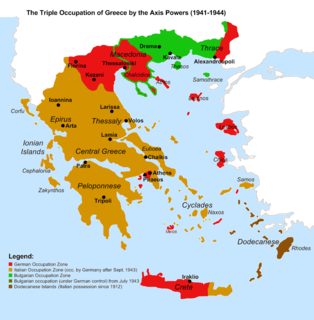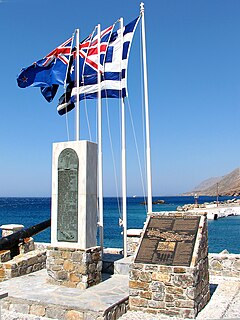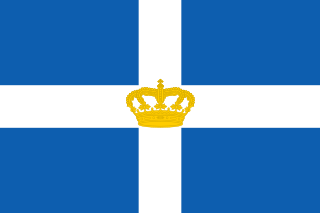 W
WThe occupation of Greece by the Axis Powers began in April 1941 after Nazi Germany invaded Greece to assist its ally, Fascist Italy, which had been at war with Allied Greece since October 1940. Following the conquest of Crete, all of Greece was occupied by June 1941. The occupation in the mainland lasted until Germany and its ally Bulgaria were forced to withdraw under Allied pressure in early October 1944. However, German garrisons remained in control of Crete and some other Aegean islands until after the end of World War II in Europe, surrendering these islands in May and June 1945.
 W
WThe military history of Greece during World War II began on 28 October 1940, when the Italian Army invaded from Albania, beginning the Greco-Italian War. The Greek Army was able to halt the invasion temporarily and was able to push the Italians back into Albania. The Greek successes forced Nazi Germany to intervene. The Germans invaded Greece and Yugoslavia on 6 April 1941, and overran both countries within a month, despite British aid to Greece in the form of an expeditionary corps. The conquest of Greece was completed in May with the capture of Crete from the air, although the Fallschirmjäger suffered such extensive casualties in this operation that the Oberkommando der Wehrmacht abandoned large-scale airborne operations for the remainder of the war. The German diversion of resources in the Balkans is also considered by some historians to have delayed the launch of the invasion of the Soviet Union by a critical month, which proved disastrous when the German Army failed to take Moscow.
 W
WThe Greek National Socialist Party was a Nazi party founded in Greece in 1932 by George S. Mercouris, a former Cabinet minister.
 W
WThe Haidari concentration camp was a concentration camp operated by the German Schutzstaffel at the Athens suburb of Haidari during the Axis occupation of Greece in World War II. Operating from September 1943 until it was shut down in September 1944, it was the largest and most notorious concentration camp in wartime Greece, becoming known as the "Bastille of Greece".
 W
WThe Levant Schooner Flotilla was an allied naval organization during World War II that facilitated covert and irregular military operations in the Aegean Sea from 1942–1945. It was primarily organized by the British Royal Navy and consisted of a series of commandeered caïques, or local schooners, manned by British sailors, special forces, and Greek volunteers.
 W
WThe 4th of August Regime, commonly also known as the Metaxas regime, was a totalitarian regime under the leadership of General Ioannis Metaxas that ruled the Kingdom of Greece from 1936 to 1941. On 4 August 1936, Metaxas, with the support of King George II, suspended the Greek parliament and went on to preside over a conservative, staunchly anti-communist government. The regime took inspiration in its symbolism and rhetoric from Fascist Italy, but retained close links to Britain and the French Third Republic, rather than the Axis powers. Lacking a popular base, after Metaxas' death in January 1941 the regime hinged entirely on the King. Although Greece was occupied following the German invasion of Greece in April 1941 and the Greek government was forced into exile in the British-controlled Kingdom of Egypt, several prominent figures and features of the regime, notably the notorious security chief Konstantinos Maniadakis, survived for several months in cabinet until the King was forced to dismiss them in a compromise with the representatives of the old democratic political establishment.
 W
WThe military history of Greece during World War II began on 28 October 1940, when the Italian Army invaded from Albania, beginning the Greco-Italian War. The Greek Army was able to halt the invasion temporarily and was able to push the Italians back into Albania. The Greek successes forced Nazi Germany to intervene. The Germans invaded Greece and Yugoslavia on 6 April 1941, and overran both countries within a month, despite British aid to Greece in the form of an expeditionary corps. The conquest of Greece was completed in May with the capture of Crete from the air, although the Fallschirmjäger suffered such extensive casualties in this operation that the Oberkommando der Wehrmacht abandoned large-scale airborne operations for the remainder of the war. The German diversion of resources in the Balkans is also considered by some historians to have delayed the launch of the invasion of the Soviet Union by a critical month, which proved disastrous when the German Army failed to take Moscow.